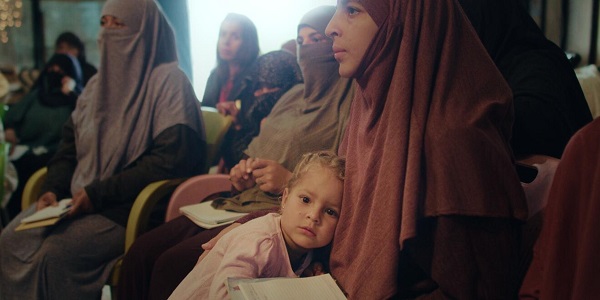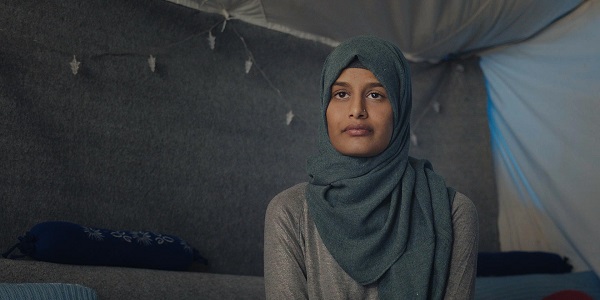SXSW 2021: THE RETURN: LIFE AFTER ISIS & LUCHADORAS
Continuing on from my coverage of documentaries from SXSW 2021, I wrote about a documentary that details the lives of a few European and North American women who live in a Syrian displacement camp after they left their countries to join ISIS and have now had their citizenships revoked, including former East London schoolgirl Shamima Begum, and a portrait of the courageous female wrestlers of Mexico.
The Return: Life After ISIS (Alba Sotorra Clua)
I was astounded by The Return: Life After ISIS. I was astonished by its access, astonished by its empathy and astonished by its existence. This documentary, which follows various women who are now stateless after their citizenship is stripped due to leaving their Western countries to join ISIS, is one of the most powerful films centred on the Islamic State.
But why was I so floored by Alba Sotorra’s storytelling? I would attribute that to the thorough dehumanisation of these women in the media. These women, who include Shamima Begum and Hoda Muthana, have been assigned a simple narrative – former brides of ISIS. They know their public image, exemplified when we see Begum watch herself be discussed on Good Morning Britain. For Sotorra and her team to have gained extensive access to their lives in the displacement camp is quite the coup.
We are situated in the heart of the Roj detention camp in North-East Syria, home to 1500 women and kids from 56 different countries. Local Kurdish forces oversee the camp; women’s rights activists Zozan Aloush and Sevinaz Evdike run workshops for the women, who also include Kimberly Gwen Polman from Canada, Hafida Haddouch and Nawal Hammoudi from the Netherlands, as well as Begum and Muthana. Intimate interviews are shot in their tents, where we listen to them speak about the breadth of their journey, from what led them to leave Britain to the day-to-day realities of being an ISIS bride to the dangers posed if they publicly admonished Jihadism.

They’re of a generation who have grown up during the humanitarian crisis in the Middle East. The footage of Syrian kids crying after having their parents killed and houses bombed by foreigners told them one thing – as far as they knew, travelling there was the only way to help. As if they were a charitable organisation, ISIS used these videos to plead to the emotion of influenceable youngsters around the world, telling them that nobody else was going to help Syria, certainly not the West.
But when the girls got there, life was nothing like they expected. They were segregated by gender, told how to act, dress and talk, subject to the literal morality police and generally sapped off any life and purpose of being there besides marrying the men and giving birth to their children. In their new residence, they hang out and exchange anecdotes about the kind of food they’d eat if they were home (a topic that’s already become fodder for the tabloids), clean the camp together, plant seeds in memory of loved ones and take part in reconstructive workshops in which activities including writing letters to their younger selves and deconstructing propaganda videos. It’s a surprising level of empathy afforded to characters who have otherwise had zero.
Though they are victims of grooming, it’s tough to say if all audiences will be sympathetic after watching this film – it is a basic fact that they left their countries to join the most brutal terrorist organisation in modern times. Furthermore, even just a quick browse of the internet would acquaint anyone with the atrocities of this group. However, we do live in an age of fake news, where everything on the internet is under scrutiny, and Twitter should have employed its fact-checking and misinformation labels a long time ago if it was going to let accounts like Hoda Muthana’s recruiting tool go unchecked. But seeing this film makes one thing clear – rehabilitation is absolutely an option. The Return: Life After Isis is vital to the ongoing public and political debates around repatriation.

Sotorra’s film doesn’t just succeed as an informational and contextual piece – it’s also simply a superb piece of filmmaking. Firstly and foremostly, the level of access is absolutely incredible, speaking to the brilliant ability of the producers. The cinematography team, headed by three DOP’s – Gris Jordana, Núria Roldos, Lara Vilanova – are agile in their skill as observational filmmakers, capturing strong moments and focusing on emotional responses, a particularly key objective in putting a face to the central conflict. A somber score by Mehmud Berazi and Josefina Rozenwasser elevates the impact.
The Return: Life After ISIS will launch on Sky Documentaries and NOW TV in the UK this summer. A US release is yet to be confirmed.
Luchadoras (Paola Calvo, Patrick Jasim)
Luchadoras is an extraordinary observation of the life of three female wrestlers in Ciudad Juárez, Mexico, a city with a severe femicide crisis.
We follow Mini Serinita, who works in a factory (a profession with a dark cloud above it, for many women who work on the assembly lines, have been targeted by murderers) but gets paid more for her wrestling gigs and thus is seeking to establish herself as a full-time Luchadora. Baby Star, who balances the duties of a charismatic, kick-ass performer with those of a caring mother to a young girl. Then there’s Lady Candy who is separated from her own children due to visa regulations – they’re across the border in El Paso, Texas – so her fights represent a dual battle.
Directors Paola Calvo and Patrick Jasim approach the topic of wrestling not just from a personal angle but also from a sociological angle. Their documentary is so strongly situated in a social context that you really understand why wrestling is a viable way of life and the power of its symbolism in a city where so many women are murdered. The characters all have testimonies about women they knew who have been killed and the TV’s that play in the background of their daily lives are often reporting yet another homicide.

The filmmakers are patient in their character study, preferring to let the women unveil their own histories and ambitions, remaining invisible as the wrestlers function in their domesticity with no acknowledgement that they’re being filmed and never invited to do talking heads or other traditional methods of providing context for a viewing audience. We learn about them entirely through their fascinating work and their unique relationships. We learn how professional wrestling is a universal framework for their individual circumstances and how it inspires and supports a new generation of women.
It’s a visually striking film with gorgeous compositions by Jasim, who serves as the DOP as well as co-director, and close-up access that allows them to capture wonderful moments of the women bonding and musing over their place in the wrestling world and the world at large, in addition to the thrilling sequences where they wrestle and bask in the support of audiences as they play the fan favourites.
The strong aesthetic is complemented by poignant guitars strummed by German musical duo Lonski & Classen, who have hopefully received a ticket to more composing work within film. It’s hard to make the stunning, elevated landscapes of this city look bad, and it’s especially hard to make the wrestlers look bad with their awesome, inspired costumes. Luchadoras would pair well with Fighting With My Family as a compelling feminist perspective of a subculture but what makes this wrestling film stand out is the examination of social issues that envelop the subjects’ lives.
Luchadoras is currently seeking US and UK distribution.
What films at SXSW 2021 did you see? Let us know in the comments below!
Does content like this matter to you?
Become a Member and support film journalism. Unlock access to all of Film Inquiry`s great articles. Join a community of like-minded readers who are passionate about cinema – get access to our private members Network, give back to independent filmmakers, and more.
Join now!




